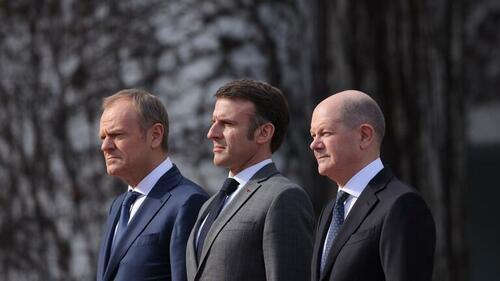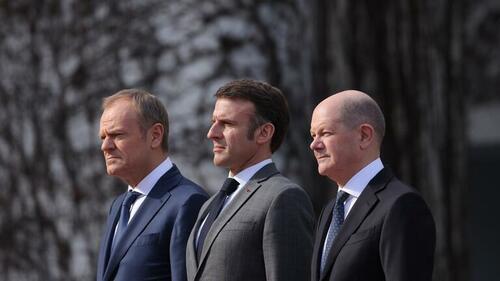The West’s Era Of Dominance Is Over, “Europe’s Decline Is Undeniable”
Authored by Timofey Bordachev via vz.ru,
Only a few years ago, most of Western Europe seemed like a fortress of stability in international politics. With robust economies, solid social systems, and the grand edifice of “European integration,” it gave an impression of permanence, impervious even to major geopolitical upheavals.
Now, however, it has become an inexhaustible source of peculiar headlines and confusion.
We see endless talk of sending “European peacekeepers” to Ukraine, drawn-out dramas over forming a government in France, or pre-election storms in a teacup in Germany. There are attempts to meddle in the Middle East, and above all, a deluge of irresponsible, often meaningless statements from Western European politicians. For outsiders, these developments provoke a mix of bemusement and concern.
In Russia, the Western side of our shared continent’s apparent decline is met with suspicion but also a certain sadness. For centuries, Western Europe has been both an existential threat and a source of inspiration for Russia. Peter the Great famously reformed the country to borrow the best from European thoughts and culture. In the 20th century, the Soviet Union, despite great sacrifices, secured victory over Nazi Germany during World War II. And for many Russians, Western Europe has long been an “Eden,” offering respite from what were often harsh realities back home.
But a Western Europe that is economically unstable, politically chaotic, and intellectually stagnant is no longer the same as what once inspired reforms or envy. It’s no longer a place Russia can look to as a neighbor worth emulating or even fearing.
How the rest of the world sees ‘Europe’
For most of the world, Western Europe’s problems provoke only curiosity. Major powers like China and India are happy to trade with its various countries and benefit from its technology and investment. But if Western Europe were to disappear from the global stage tomorrow, it wouldn’t disrupt their plans for the future. These nations are vast civilizations in their own right, historically shaped far more by internal dynamics than by European influence.
Meanwhile, African and Arab nations still view Western Europe through the lens of colonialism. For them, its decline is of material interest but little emotional consequence. Türkiye sees European countries as prey, aging and weakened rivals. Even the United States, a supposed ally, approaches the continent’s crises with a businesslike detachment, focused solely on how to maximize its own interests at Europe’s expense.
Why is this happening to Europe?
It’s tempting to blame Western Europe’s odd behavior on the degeneration of its elites. After decades under US patronage, its leaders have lost the ability to think critically or strategically. The end of the Cold War allowed them to govern without serious competition, leading to complacency and mediocrity. Many of the brightest minds went into business, leaving politics to those less capable. As a result, Western European foreign policy departments now resemble provincial bureaucracies, out of touch with global realities.
The expansion of the EU in the early 2000s, which brought in several small former Eastern European nations, only exacerbated this problem. Their provincial outlook often dominates discussions, reducing complex issues to simplistic, parochial concerns. Today, Western Europe’s politicians are adept at convincing the world – and perhaps even themselves – of their own incompetence.
But the root of the problem runs deeper. Western Europe faces a growing contradiction: its political insignificance clashes with its still-considerable material wealth and intellectual legacy. For centuries, its countries have accumulated vast resources and developed unparalleled intellectual traditions. Yet its strategic irrelevance renders these assets useless. Even France’s nuclear arsenal, once a symbol of power, now garners little respect on the world stage.
Germany, the EU’s economic powerhouse, exemplifies this impotence. Despite its wealth, it has failed to translate economic strength into political influence, even over its own affairs. The destruction of the Nord Stream pipeline in 2022, allegedly at the hands of its American allies, symbolizes the bloc’s inability to defend its interests or hold its partners accountable.
The United Kingdom, often touted as Western Europe’s most active foreign policy player, plays this role largely under American patronage. Brexit, for all its drama, did little to change this dynamic.
A century of decline
More than 100 years after the First World War dismantled Europe’s empires, the continent finds itself with resources it can no longer wield. The EU’s most recent foreign policy “victory” — the difficult absorption of impoverished Moldova — highlights its limitations. Meanwhile, Georgia, with its defiant government, remains beyond Brussels’ grasp. Even in the Balkans, the EU’s influence is limited to countries subdued by NATO and completely encircled by the US-led geopolitical order.
Perhaps the most striking aspect of modern Western Europe is its lack of reflection. Even the continent’s intellectual elite seems to live behind a wall of denial, detached from reality. This attitude extends to domestic politics, where the rise of non-mainstream parties is dismissed as voters “choosing the wrong way.” In foreign policy, its leaders continue to act as though their opinions still shape global politics, despite clear evidence to the contrary.
The EU states march on, oblivious to their diminishing power and the shifting global environment. In theory, such persistence might seem admirable. But world politics is not a Glass Bead Game, as Hermann Hesse would have put it, and clinging to outdated behaviors will only hasten Western Europe’s decline. At some point, even its vast material and intellectual wealth will no longer be enough to sustain it.
What comes next?
For Russia, Western Europe’s intellectual and moral stagnation presents both challenges and questions. Historically, the EU was a neighbor that inspired reforms and shaped foreign policy strategies. But how does one engage with a declining power that refuses to acknowledge its own fall? And if the bloc is no longer a meaningful counterpart, who will become Russia’s new “unifying other”?
These are questions Russia must answer as it navigates a world where Western Europe’s influence continues to wane. Whatever the answer, it’s clear that its era of dominance is over. Its decline is undeniable – even if Western Europeans themselves refuse to see it.
* * *
Views expressed in this article are opinions of the author and do not necessarily reflect the views of ZeroHedge.
Tyler Durden
Fri, 12/27/2024 – 03:30


